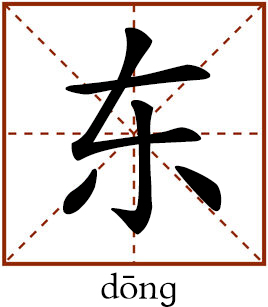East

This character refers to “east.” Its meaning can be extended to “host,” such as fang dong (landlord) and gu dong (shareholder).
白水绕东城
bái shuǐ rào dōnɡ chéng
Bai means “white” and shui “water.” Rao means “to surround” while dong cheng refers to the east of a city.
This is a line from a poem by Li Bai (701–762). The poem titled “Song You Ren” (“Taking Leave of a Friend”) depicts a scenario in which the poet and his friend part unwillingly. There are various translations of this poem, however, none of them do it justice. A translation by the Japanese translator Shigeyoshi Obata is as follows: “Blue mountains lie beyond the north wall;/ Round the city’s eastern side flows the white water./ Here we part, friend, once forever./ You go ten thousand miles, drifting away/ Like an unrooted water-grass./ Oh, the floating clouds and the thoughts of a wanderer!/ Oh, the sunset and the longing of an old friend!/ We ride away from each other, waving our hands,/ While our horses neigh softly, softly…” Obata mistook the gu peng (a single tumbleweed) from the original as water-grass, a mistake that many translators have made. Since tumbleweeds habitually break away from their roots and roll around in the wind, it often symbolizes a wandering life in ancient Chinese literature. In the original, the use of tumbleweed also reveals Li’s deep concern about his friend’s future.
The essence of the poem lies in its last four lines. Here are some other translations: “Your heart was full of wandering thought;/ For me, -- my sun had set indeed” (trans. H. A. Giles); “The floating clouds wander everywhere as does man;/ Day is departing—it and my friend” (trans. Amy Lowell); “I shall think of you in a floating cloud;/ So in the sunset think of me” (trans. Witter Bynner). Some translations miss the similes used by Li to portray the friend’s long-cherished wishes to be a carefree traveler (like “floating clouds”) and to express Li’s own deep sentimental attachment towards his friend at the parting (like “sunset”). In the final couplet, foiled with the whinny of the two horses which are also unwilling to part, the poet and his friend wave goodbye, leaving a parting silhouette against the sunset, and a lingering, sentiment in the reader.
edited by REN GUANHONG
